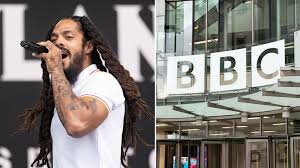Media censorship in the name of sensitivity: BBC’s failure on Gaza coverage

TEHRAN- The recent decision by the BBC to pull several senior staff and issue a formal apology after airing Bob Vylan’s Glastonbury 2025 performance marks a troubling chapter in media censorship and the suppression of legitimate protest against the ongoing genocide in Gaza.
The rap-punk duo’s outspoken condemnation of Israel’s military actions and their call for dismantling what they termed a “violent military machine” was met not with support for free speech or acknowledgment of Palestinian suffering, but with accusations of antisemitism, internal BBC disciplinary actions, and criminal investigations against the artists.
This reaction exposes a deep-rooted bias within mainstream Western media institutions and raises serious questions about their role in shaping public discourse on the Israeli-Palestinian conflict.
Bob Vylan’s performance, which included the chant “Death, death to the IDF,” was framed by the BBC Chair Samir Shah and Director-General Tim Davie as “unconscionable antisemitic views” and “offensive and deplorable behavior.” The BBC’s apology specifically singled out the Jewish community, while ignoring the context in which these words were spoken — a protest against Israeli forces’ brutal military campaign in Gaza, which has resulted in massive civilian casualties and widespread destruction. The band clarified that their remarks were not targeted at any ethnic or religious group but were a denunciation of systemic violence, a nuance lost in the BBC’s narrative and subsequent punitive measures.
The BBC’s editorial failure to cut the live stream immediately, followed by a decision to ban “high risk” acts from future live broadcasts, reflects a broader institutional unwillingness to confront uncomfortable truths about Israel’s actions in Palestine.
Instead of facilitating open dialogue or highlighting the humanitarian crisis, the BBC chose to prioritize appeasing political pressure from British officials and media regulators, who condemned the broadcast as a “problem of leadership” and demanded accountability at the highest levels.
This political interference undermines journalistic independence and silences voices that challenge dominant geopolitical narratives.
Moreover, the backlash against Bob Vylan extended beyond the BBC. The band was dropped from multiple festival lineups across the UK and Europe, faced criminal investigations by police forces, and had their US visas revoked.
Such coordinated efforts to suppress dissenting voices reveal an alarming trend where artists and activists are penalized for speaking out against the genocide in Gaza, while the media largely fails to cover the scale of Palestinian suffering adequately.
This incident is emblematic of a wider crisis in Western media coverage of the Israeli-Palestinian conflict. The BBC’s disproportionate focus on alleged antisemitism in Bob Vylan’s remarks, without equally addressing Israel’s documented war crimes and the humanitarian catastrophe in Gaza, points to a systemic imbalance. It also diverts public attention from the real issue — the ongoing obliteration of Palestinian lives and homes. As Bob Vylan themselves stated, “We serve as a distraction from the real issues,” highlighting how the outrage over their performance is used to overshadow the media’s failure to report on the genocide.
Leave a Comment